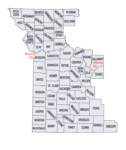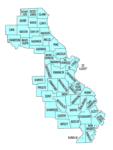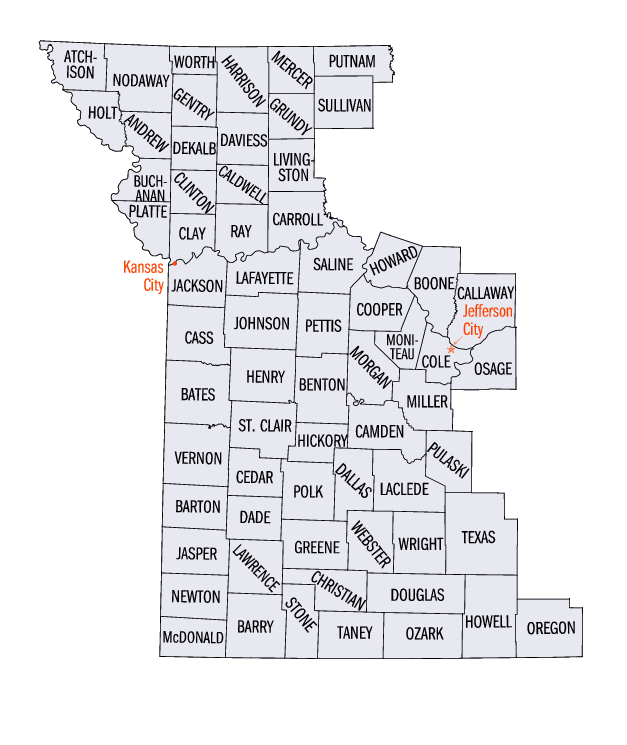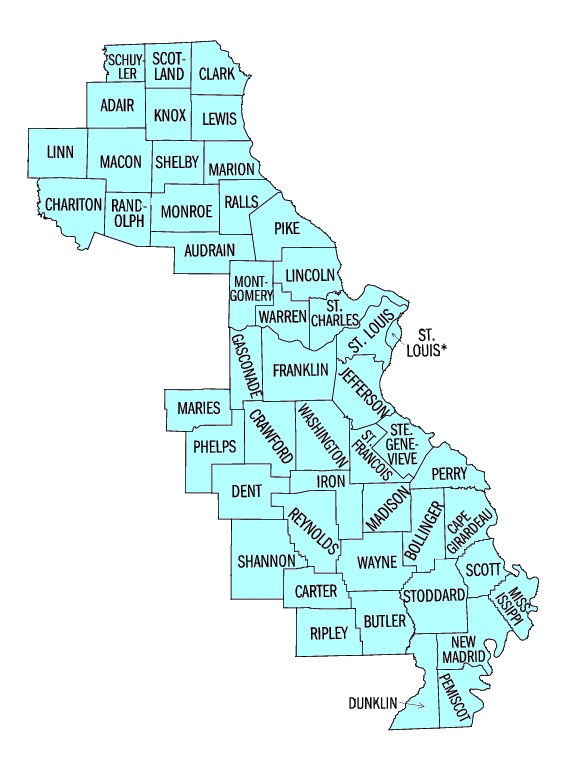Missouri Federal Districts:
Western and Eastern
Below you will find information on standard conditions of supervision and travel restrictions, as well as sex offender registry requirements.
Always follow the conditions and restrictions given to you by your U.S. Probation Officer.
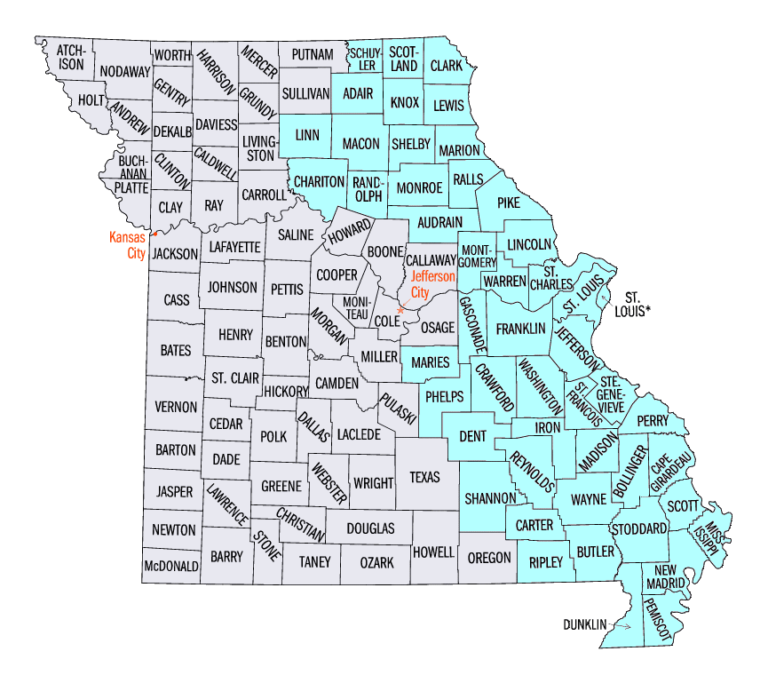
Select your district below:
Standard Conditions of Supervision
These are the standard conditions of supervision or probation the Court must impose. This does not include special conditions the court may impose.
- The defendant shall not leave the judicial district without the permission of the court or probation officer.
- The defendant shall report to the probation officer in a manner and frequency directed by the court or probation officer.
- The defendant shall answer truthfully all inquiries by the probation officer and follow the instructions of the probation officer.
- The defendant shall support his or her dependents and meet other family responsibilities.
- The defendant shall work regularly at a lawful occupation unless excused by the probation officer for schooling, training, or other acceptable reasons.
- The defendant shall notify the probation officer at least ten days prior to any change in residence or employment.
- The defendant shall refrain from excessive use of alcohol and shall not purchase, possess, use, distribute, or administer any controlled substance or any paraphernalia related to any controlled substance, except as prescribed by a physician.
- The defendant shall not frequent places where controlled substances are illegally sold, used, distributed, or administered.
- The defendant shall not associate with any persons engaged in criminal activity and shall not associate with any person convicted of a felony, unless granted permission to do so by the probation officer.
- The defendant shall permit a probation officer to visit him or her at any time at home or elsewhere and shall permit confiscation of any contraband observed in plain view of the probation officer.
- The defendant shall notify the probation officer within 72 hours of being arrested or questioned by a law enforcement officer.
- The defendant shall not enter into any agreement to act as an informer or a special agent of a law enforcement agency without the permission of the court.
- As directed by the probation officer, the defendant shall notify third parties of risks due to the defendant’s criminal record or personal history or characteristics and shall permit the probation officer to make such notifications and to the defendant’s compliance with such notification requirement.
Travel Restrictions
Travel outside the Western District of Missouri, in keeping with the conditions of supervision, is not permitted unless you have the authorization of your Probation Officer. Please request travel at least 2 weeks prior to departure. If you live in the Kansas City Metropolitan area, you may also travel in Johnson and Wyandotte Counties in Kansas.
You will generally not be allowed to travel outside the district during the first 60 days of supervision.
For more information visit the links below:
Standard Conditions of Supervision
- The defendant shall not leave the judicial district without permission of the Court or probation officer.
- The defendant shall report to the probation officer and shall submit a truthful and complete written report within the first five days of each month.
- The defendant shall answer truthfully all inquiries by the probation officer and follow the instructions of the probation officer.
- The defendant shall support his or her dependents and meet other family responsibilities.
- The defendant shall work regularly at a lawful occupation unless excused by the probation officer for schooling, training or other acceptable reasons.
- The defendant shall notify the probation officer at least ten days prior to any change of residence or employment.
- The defendant shall refrain from excessive use of alcohol and shall not purchase, possess, use, distribute, or administer any controlled substance or any paraphernalia related to any controlled substance, except as prescribed by a physician.
- The defendant shall not frequent places where controlled substances are illegally sold, used, distributed, or administered.
- The defendant shall not associate with any persons engaged in criminal activity, and shall not associate with any person convicted of a felony unless granted permission to do so by the probation officer.
- The defendant shall permit a probation officer to visit him or her at any time at home or elsewhere and shall permit confiscation of any contraband observed in plain view by the probation officer.
- The defendant shall notify the probation officer within seventy-two hours of being arrested or questioned by a law enforcement officer.
- The defendant shall not enter into any agreement to act as an informer or special agent of a law enforcement agency without the permission of the Court.
- As directed by the probation officer, the defendant shall notify third parties of risks that may be occasioned by the defendant’s criminal record or personal history or characteristics, and shall permit the probation officer to make such notifications and to confirm the defendant’s compliance with such notification requirement.
Travel Restrictions
You may not leave the Eastern District of Missouri without specific permission from your Probation Officer. Any travel outside the district requires advance written permission. Overnight travel within the district exceeding two nights should be reported to your Probation Officer. All other travel requests within the continental United Sates should be made at least two weeks in advance.
For more information visit the links below:
What is the sex offender registry?
What is the Sex Offender Registry?
Every state and U.S. territory requires those convicted of sex offenses to be added to a registry to be monitored and tracked after their release back into the community. Information about the offender is collected and shared with local and federal authorities, as well as the general public. Requirements and restrictions are often placed on registered sex offenders. That registration process is unique in each state and U.S. territory.

What is SORNA?
The Sex Offender Registration and Notification Act (SORNA) was passed in 2006 as part of the Adam Walsh Child Protection and Safety Act to provide federal standards for jurisdictions to follow. SORNA calls for states and U.S. territories to meet minimum requirements for sex offender registration and notification.
Why Are the Requirements for Sex Offender Registration Different Everywhere?
While SORNA’s guidelines streamlined registration and notification requirements across the country, these requirements are far from uniform. Each jurisdiction determines the details of their own registration process. This leaves a patchwork of rules for sex offenders that vary widely depending on where a registrant lives or works.
Where PIN Comes In
Probation Information Network developed a list of questions regarding the sex offender registration requirements across the country. These are questions that might concern the public, victims and their advocates, or those who are facing registration or are currently registered and their loved ones. We then searched the statutes or code of each jurisdiction for the laws surrounding sex offender registration and notification. Where necessary, we consulted with the law enforcement agency in charge of the jurisdiction’s registry to provide clear and concise answers to the following questions:
- What is the duration of registration?
How long must a sex offender remain on the registry? The length of time a sex offender must comply with registration requirements varies widely depending on the jurisdiction where the registrant lives, and the level of the offense committed. All but 2 jurisdictions offer a path for eventual removal from the registry for at least some of their registrants.
- Must the immediate community be notified directly, either by the offender or law enforcement?
Every jurisdiction has passive community notification in the form of a public sex offender registry website. Concerned citizens are free to search the website and can sign up for email notifications if a sex offender moves into their neighborhood. Some jurisdictions go even further and require active notification, where either law enforcement or the offender themselves is required to directly notify the immediate community that a sex offender is in the area. This can take many forms, including electronic, mail, or in-person notification, publication in local newspapers, and community meetings.
- What are the residence distance restrictions?
Are there any restrictions on where a registered sex offender can live? Some jurisdictions restrict registrants from living within a measured distance of certain places. This restriction could be for all registrants, or only for higher-level offenders or those under supervision. Some jurisdictions do not have a state-wide restriction but do allow local jurisdictions to enact their own.
- What are the employment distance restrictions?
Registered sex offenders are usually restricted from certain types of employment, and from working at establishments that specifically cater to minors. Some jurisdictions go even further and restrict registrants from working within a measured distance of certain places.
- Is an employer’s information included on the public registry?
Returning citizens of every type need to find employment upon reentry, and sex offenders are no exception. Some jurisdictions include registrants’ employment information on the public registry website. This could be the employer’s address or in some cases the name of the employer.
- Are online identifiers included on the public registry?
Some jurisdictions require registered sex offenders to report any identifiers they use online, such as email addresses and social media user names. In some jurisdictions that information is included on the public registry website, separate from the registrant’s profile, in a feature that allows the public to search by specific identifiers.
- Is a state-issued ID required to be labeled?
Some jurisdictions require a state-issued ID, such as a driver’s license, to be labeled to identify the holder as a registered sex offender. This label could be the words “Sex Offender” printed on the ID in a prominent place or a more subtle designation known to law enforcement.
- What is the cost of registration?
Is there a fee to register as a sex offender? Some jurisdictions pass on some of their administrative costs to the registrants. This could be a one-time fee paid only upon initial registration, or an ongoing fee paid annually or quarterly. Some jurisdictions charge a fee every time a registrant updates their information.
- How long can a registrant be in the state for work or education before registration is required?
Does a sex offender have to register if they work or go to school in a different state? It depends on the state, and how long the registrant will be there. Some jurisdictions require registrants to notify authorities immediately, while others allow limited stays without requiring registration. Registrants currently under supervision usually need permission from their Parole or Probation Officer before traveling and should always consult their supervising officer.
- How long can a registrant visit the state before registration is required?
Can a registered sex offender go on vacation? Does a sex offender have to register if they visit a different state? It depends on the state, and how long the registrant will be there. Some jurisdictions require registrants to notify authorities immediately, while others allow limited stays without requiring registration. Registrants currently under supervision usually need permission from their Parole or Probation Officer before traveling and should always consult their supervising officer.
The answers provided are taken directly from the laws found on the state or territory’s legislative website or, where necessary, from the website of the law enforcement agency in charge of the jurisdiction’s registry. In some cases, we contacted state or territory officials for clarification and have directly quoted those conversations.
Disclaimer
While we stand by our research, it is for informational purposes only. It should not be considered legal advice and, while we strive to provide accurate and up to date information, it is not guaranteed to be complete or correct. We provide links to each jurisdiction’s legislative and law enforcement websites and maintain a directory of lawyers who specialize in sex offender registration laws. For those currently under supervision, consult with your Parole or Probation Officer for guidance.
What is the duration of registration?
MO Rev Stat § 589.400.
4. The registration requirements shall be as follows:
(1) Fifteen years if the offender is a tier I sex offender as provided under section 589.414;
(2) Twenty-five years if the offender is a tier II sex offender as provided under section 589.414; or
(3) The life of the offender if the offender is a tier III sex offender.
5. (1) The registration period shall be reduced as described in subdivision (3) of this subsection for a sex offender who maintains a clean record for the periods described under subdivision (2) of this subsection by:
(a) Not being adjudicated of any offense for which imprisonment for more than one year may be imposed;
(b) Not being adjudicated of any sex offense;
(c) Successfully completing any periods of supervised release, probation, or parole; and
(d) Successfully completing an appropriate sex offender treatment program certified by the attorney general.
(2) In the case of a:
(a) Tier I sex offender, the period during which the clean record shall be maintained is ten years;
(b) Tier III sex offender adjudicated delinquent for the offense which required registration in a sex offender registry under sections 589.400 to 589.425, the period during which the clean record shall be maintained is twenty-five years.
(3) In the case of a:
(a) Tier I sex offender, the reduction is five years;
(b) Tier III sex offender adjudicated delinquent, the reduction is from life to that period for which the clean record under paragraph (b) of subdivision (2) of this subsection is maintained.
Must the immediate community be notified directly, either by the offender or law enforcement?
No.
What are the residence distance restrictions?
MO Rev Stat § 566.147.
1. Any person who, since July 1, 1979, has been or hereafter has been found guilty of:
(1) Violating any of the provisions of this chapter or the provisions of section 568.020, incest; section 568.045, endangering the welfare of a child in the first degree; subsection 2 of section 568.080 as it existed prior to January 1, 2017, or section 573.200, use of a child in a sexual performance; section 568.090 as it existed prior to January 1, 2017, or section 573.205, promoting a sexual performance by a child; section 573.023, sexual exploitation of a minor; section 573.025, promoting child pornography in the first degree; section 573.035, promoting child pornography in the second degree; section 573.037, possession of child pornography, or section 573.040, furnishing pornographic material to minors; or
(2) Any offense in any other jurisdiction which, if committed in this state, would be a violation listed in this section;
shall not reside within one thousand feet of any public school as defined in section 160.011, any private school giving instruction in a grade or grades not higher than the twelfth grade, or any child care facility that is licensed under chapter 210, or any child care facility as defined in section 210.201 that is exempt from state licensure but subject to state regulation under section 210.252 and holds itself out to be a child care facility, where the school or facility is in existence at the time the individual begins to reside at the location. Such person shall also not reside within one thousand feet of the property line of the residence of a former victim of such person.
2. If such person has already established a residence and a public school, a private school, or child care facility is subsequently built or placed within one thousand feet of such person’s residence, or a former victim subsequently resides on property with a property line within one thousand feet of such person’s residence, then such person shall, within one week of the opening of such public school, private school, or child care facility, or the former victim residing on the property, notify the county sheriff where such public school, private school, child care facility, or residence of a former victim is located that he or she is now residing within one thousand feet of such public school, private school, child care facility, or property line of the residence of a former victim, and shall provide verifiable proof to the sheriff that he or she resided there prior to the opening of such public school, private school, or child care facility, or the former victim residing on the property.
3. For purposes of this section, “resides” means sleeps in a residence, which may include more than one location and may be mobile or transitory, but shall not include transitory or longer term presence in facilities licensed under chapters 197 and 198 for purposes of receiving care, treatment, or services from such licensed facility.
4. For the purposes of the section, one thousand feet shall be measured from the edge of the offender’s property nearest the public school, private school, child care facility, or former victim to the nearest edge of the public school, private school, child care facility, or former victim’s property.
What are the employment distance restrictions?
None.
Is an employer's information included on the public registry?
Yes.
MO Rev Stat § 589.402.
3. Only the information listed in this subsection shall be provided to the public in the registered sexual offender search:
(4) The residence, temporary, work, and school addresses of the offender, including the street address, city, county, state, and zip code;
Are online identifiers included on the public registry?
Offenders must register online identifiers. While this information is not included on an offender’s registry profile, there is a separate search feature that allows the public to search by specific online identifiers.
MO Rev Stat § 589.402.
3. Only the information listed in this subsection shall be provided to the public in the registered sexual offender search:
(10) Any online identifiers, as defined in section 43.651, used by the person. Such online identifiers shall not be included in the general profile of an offender on the web page and shall only be available to a member of the public by a search using the specific online identifier to determine if a match exists with a registered offender.
Is a state-issued ID required to be labeled?
No.
What is the cost of registration?
MO Rev Stat § 589.400.
6. For processing an initial sex offender registration the chief law enforcement officer of the county or city not within a county may charge the offender registering a fee of up to ten dollars.
7. For processing any change in registration required pursuant to section 589.414 the chief law enforcement official of the county or city not within a county may charge the person changing their registration a fee of five dollars for each change made after the initial registration.
How long can a registrant be in the state for work or education before registration is required?
MO Rev Stat § 589.400.
1. Sections 589.400 to 589.425 shall apply to:
(8) Any person who has been or is required to register in another state, territory, the District of Columbia, or foreign country, or has been or is required to register under tribal, federal, or military law and who works or attends an educational institution, whether public or private in nature, including any secondary school, trade school, professional school, or institution of higher education on a full-time or on a part-time basis or has a temporary residence in Missouri. “Part-time” in this subdivision means for more than seven days in any twelve-month period.
11. Any nonresident worker, including work as a volunteer or intern, or nonresident student shall register for the duration of such person’s employment, including participation as a volunteer or intern, or attendance at any school of higher education whether public or private, including any secondary school, trade school, professional school, or institution of higher education on a full-time or part-time basis in this state unless granted relief under section 589.401. Any registered offender shall provide information regarding any place in which the offender is staying when away from his or her residence for seven or more days, including the period of time the offender is staying in such place. Any registered offender from another state who has a temporary residence in this state and resides more than seven days in a twelve-month period shall register for the duration of such person’s temporary residency unless granted relief under section 589.401.
How long can a registrant visit the state before registration is required?
MO Rev Stat § 589.400.
11. Any nonresident worker, including work as a volunteer or intern, or nonresident student shall register for the duration of such person’s employment, including participation as a volunteer or intern, or attendance at any school of higher education whether public or private, including any secondary school, trade school, professional school, or institution of higher education on a full-time or part-time basis in this state unless granted relief under section 589.401. Any registered offender shall provide information regarding any place in which the offender is staying when away from his or her residence for seven or more days, including the period of time the offender is staying in such place. Any registered offender from another state who has a temporary residence in this state and resides more than seven days in a twelve-month period shall register for the duration of such person’s temporary residency unless granted relief under section 589.401.
